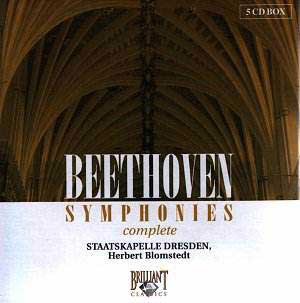This is a five CD box set housed in slimline card sleeves
with minimal information about the music and not much about the performers,
recording dates and venues etc. However, it can be obtained at ultra/super
bargain price (as little as £10 from some sources!) and contains some
exquisite performances. If the absence of sleevenotes, the analogue
source and the fact that the cycle is performed on modern rather than
period instruments present you with no problems then its purchase is
more or less self-recommending.
Personally speaking, I havenít listened to a great
deal of Beethoven recently, especially the symphonies, and memories
of original LP issues by conductors such as Karajan, Klemperer, Jochum
and Sanderling, acquired in my teens, were not entirely banished by
this set. However, I have listened a lot to Herbert Blomstedt, in the
intervening years, especially his two brilliant Nielsen cycles, the
first with the DNRSO on HMV/EMI and the more recent one recorded for
Decca in San Francisco. Here, as on those recordings, Blomstedt emphasises
the rhythmicity and musicality rather than going in for any bombastic
heroics. In fact the idea, as put forward by Robert Simpson (among others),
that Nielsen is a central figure in the evolution of the great European
symphonic tradition (with Haydn, Beethoven and Bruckner as progenitors
and maybe people like Holmboe, Rubbra (?) and Simpson himself as heirs),
fits well with these particular Beethoven performances.
The first CD accommodates symphonies 1 and 3; the former
is well executed but, perhaps unsurprisingly, it is that of the "Eroica"
that remains longest in the memory, Blomstedtís way with it certainly
allows it to live up to its name but without ever resorting to empty
rhetoric. It is, to these ears at least, a marvellously well-paced version
and has a vision that goes well beyond that of the other recording I
own (Vienna/Solti).
The second disc couples the second and the fourth.
These are both given excellent, rhythmically buoyant but highly lyrical
performances, albeit ones, along with that of the first, that period-instrument
purists may balk at (the sound has a fullness that may be slightly at
odds with the early symphoniesí temporal proximity to classical, as
opposed to romantic, models).
From this point onwards, the set begins to rank even
higher in my estimation; the disc containing the fifth and sixth is
a wonderful listen. After a first movement lacking some of the (melo?)drama
of many versions (not necessarily a bad thing), its momentum builds
to a relentless (in the best sense of the word) third movement and a
breathtaking finale. The sixth is a version which places a clear emphasis
on its rustic inspirations; the musical portrayals of birdsong, dancing,
merrymaking and thanksgiving are all underpinned by some lovely string
and woodwind textures and the whole piece begs the question (and not
for the first time) of what and where are the musical (and spiritual)
heirs to this piece? For such a well-loved and well-exposed symphony,
it seems to me that it has engendered very few direct inspirations (please
comment on the bulletin board if you disagree or you can suggest any
heirs to the piece!).
Wagner called the seventh symphony "the apotheosis
of the dance" and Blomstedtís response to this music fully justifies
that description Ė his approach here very much brings to mind his Nielsen
fourth and, like that piece, it reminds us, quite uncategorically, that
"music is the sound of life". The tempi adopted are ideal
(or sound it) and the performance in general, for which the brass section
in particular deserves special credit, displays a genuine joyfulness,
although it can plumb the emotional depths in the second movement when
required.
The eighth is an apt coupling for the seventh, in terms
of it being written at more or less the same time and by the fact that
it both complements and contrasts with the character of its predecessor.
By this, I mean that it shares many of the rhythmic nuances but is somewhat
lighter and less intense in its overall demeanour. Needless to say,
Blomstedtís efforts here show a keen awareness of this, and once again
the (individual) disc, as a self-contained listening experience, is
enriched as a result.
Maybe the best of all was saved until last. The ninth
was the final instalment of the cycle to be recorded and, among other
qualities, it has some truly memorable solo and choral singing in the
glorious "An die Freude" finale. The preceding movements are
also incredibly well done and comparison with a (generally highly regarded)
Karajan performance of similar vintage does leave one wondering if Dresden
and not Berlin is/was the German orchestra, par excellence. This
may sound like heresy to some but this recording really is so good that
it demands and deserves comparison with the very best. At the risk of
repetition, the word momentum again springs to mind but Blomstedt's
cycle, taken as a whole, is characterised by the very qualities that
also define, to my mind, Beethoven's unique genius - the pure musicality,
the rhythmic awareness, the universal spirituality even.
So, overall, the playing is of the very highest standard
and additionally Blomstedt manages to produce performances which are
often searingly intense yet never over- romanticised. The recordings
have been transferred very well and no-one buying this set, particularly
at the price it is offered, could be disappointed with it. An immensely
enjoyable listening experience; if you donít like this then you probably
donít like classical music (or, for that matter, any music as
we understand the term)!
N.B. these discs may also still be available (at mid-price),
presumably with more detailed notes, either separately or as a full
set on Berlin Classics but considering this release and the Barshai/Shostakovich
set, whoever is charged with selecting the material for Brilliant Classics
to license is doing a brilliant job.
Neil Horner


